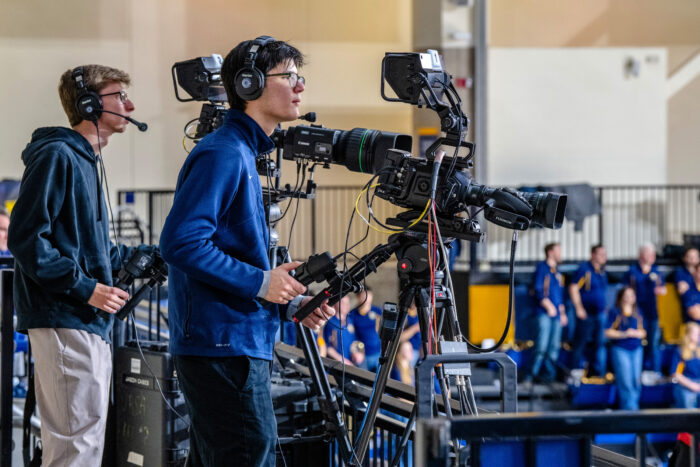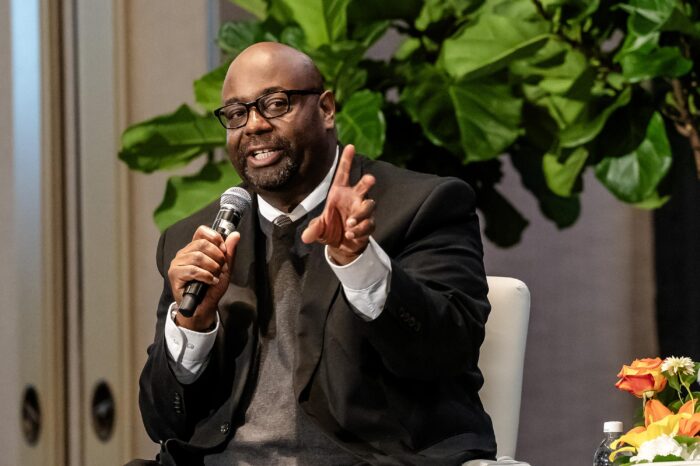As she sat in Dr. April Song’s Emerging Technologies class, learning about everything from brain-computer interfaces to generative artificial intelligence, junior marketing and information systems major Esmeralda Leon Perez thought about her parents’ restaurant on Milwaukee’s south side. She had just learned to code in Python and was starting to see how useful those new skills could be for a small business like her family’s.
“Throughout the years, we’ve been slowly implementing more technology, like the use of different delivery apps such as GrubHub or Eighth Street,” Perez says. “I think it would be very cool to create our own app; it would give our customers a personalized experience and improve their loyalty.”
Applying technology to solve business problems is the core focus of the information systems major, a theme apparent in the Emerging Technologies class. The class gave undergraduates a broad overview of the technology landscape, then challenged them to use their creativity and prior knowledge to create value with what they just learned. “There wasn’t a single day when we weren’t learning something new,” Perez says.
Covering a topic as broad as business technology in meaningful depth means moving quickly. Students learn about a new area of tech each week, consuming a brief overview of its history, how it’s used and what it could do in the future. At the end of the class, students have to research one of the technologies they learned about and make a detailed presentation about its use cases.
For Stevie Mitchell, a senior double majoring in marketing and information systems, the most fascinating unit was the one about 3D printing. Mitchell listened as Song described how 3D printed houses, drones and health care products had the potential to disrupt their market segments, and knew he’d found his final presentation topic.
“I was just amazed at all the things that are out there with this technology, and I would have never even known about them without this class,” says Mitchell, who is also a student-athlete.
The class also has an intensive coding component. Song would project the code for certain computer functions on a screen in front of the class, then challenge the students to replicate what she did. Students spent classes trying to get their code to work, with Song walking around to help students troubleshoot.
“Creativity and the coding are two separate parts of my brain, but when you put them together, they become something beautiful.”
Jonalie Zamora, junior
The class is especially helpful for people looking to be technology consultants, as Perez and her classmate, junior Jonalie Zamora, are. Both students will intern with Accenture this summer. Coming into the internship with a grounding in the kinds of technology the firms work with gives them a leg up on making the transition from student to professional.
“As I’m exposed to more things, I think I’ll be able to get a handle on them faster, just because I’ve already figured out my learning strategy when it comes to these new technologies,” Zamora says.
Mitchell had a similar experience interning in the private asset management department at Baird the prior summer.
“I was able to see the code they were using and understand it; that made me feel good,” Mitchell says.
The Emerging Technology class is part of a challenging information systems curriculum meant to simulate the conditions of industry work. In other parts of the curriculum, students must construct their own tech stack to run an application, learn how to code in dense programming languages such as PHP and figure out how to apply information from vast databases. In one particularly difficult website development class, students are tasked with rebuilding Checkmarq, the university’s student administration platform, right down to the ability to register for courses.
Students register for courses like these for the marketable skills and the applied learning experiences, but also because of the instructors. Perez and Mitchell specifically credit Dr. Terence Ow, professor of information systems, analytics and supply chain management and Wipfli Fellow in AI, for recruiting them to the major after their introductory classes.
“The amount of care and passion he showed really convinced me to go down the information systems road,” Mitchell says. “You don’t turn away relationships like that when you come across someone who genuinely cares about you.”
For Zamora, who sells knitted and crocheted products through Student Made Marquette, there are plenty of ways to put what she learned in Emerging Technology into practice, even outside the professional world.
“Writing up patterns for crochet is very repetitive, but it’s mathematical, so I can plug the pattern into a line of code and have it generated for me,” Zamora says. “The creativity and the coding are two separate parts of my brain, but when you put them together, they become something beautiful.”



